Dachshunds are notorious diggers 🕳️. Their instinct to burrow can quickly turn your yard into a mini excavation site 🏡. Many owners find that consistent training is the best approach to stop dachshund digging behaviors before they become habits 🎯.
These lovable wiener dogs were bred to hunt badgers and other burrowing animals, so digging is literally in their DNA 🐾.
You can stop your dachshund from digging by providing proper exercise, creating a designated digging area, and addressing the underlying causes of the behavior 🧩.
Dealing with a digging dachshund takes patience and a bit of understanding 🤗. Your furry friend isn’t out to destroy your yard out of spite—they might just be bored, anxious, hunting for critters, or trying to cool off in hot weather 🌞.
Figuring out why your dachshund digs is the first step toward finding a fix that actually works 🧐.
Key Takeaways ✅
- Regular exercise and mental stimulation can seriously cut down on unwanted digging in dachshunds. 🐕
- Creating a special digging zone with buried toys and treats gives them a place to channel that burrowing urge. 🎾
- Consistent training and positive reinforcement help set boundaries and change digging habits. 🐶
🐾 Free Dachshund Care Guide
Download our free checklist to ensure your Dachshund stays happy, healthy, and well-loved!
Get Your Free Guide 🐶Why Do Dachshunds Dig?
Dachshunds were bred to hunt badgers and other burrowing animals 🦡. No surprise, their natural digging behaviors run deep 🌱.
Their name literally means “badger dog” in German 🇩🇪. That says it all, doesn’t it?
Genetic Instincts and Breed Behavior 🧬
Dachshunds have powerful instincts that push them to dig 💪. These little guys were bred to chase prey underground, using their strong front paws and determined nature to excavate tunnels 🕳️.
Your doxie’s digging is hardwired 🧠. Their long bodies, short legs, and sturdy chests were made for digging and squeezing through tight spots 🐾.
When your Dachshund digs, they’re just doing what their ancestors did to survive. That hunting instinct is still strong, even in today’s couch-loving pups 🛋️.
Most Dachshund owners see their dogs:
- Dig frantically when they catch a scent 🐽
- Try to make tunnel systems 🌿
- Get laser-focused while digging 🎯
- Look pretty pleased after a good dig 😄

🥗 Wild Earth Dog Food – Clean Nutrition for Healthier Doxies
This vet-developed, plant-based dog food supports digestion, immunity, and energy—perfect for your sensitive or allergic Dachshund.
- ✅ 100% cruelty-free and vegetarian
- ✅ Promotes healthy weight & shiny coat
- ✅ No fillers, artificial flavors, or animal byproducts
Environmental Triggers 🌳
Your Dachshund’s environment can really influence their digging 🌍. If your yard is full of interesting smells, sounds, or sights, their hunting instincts kick in 🚨.
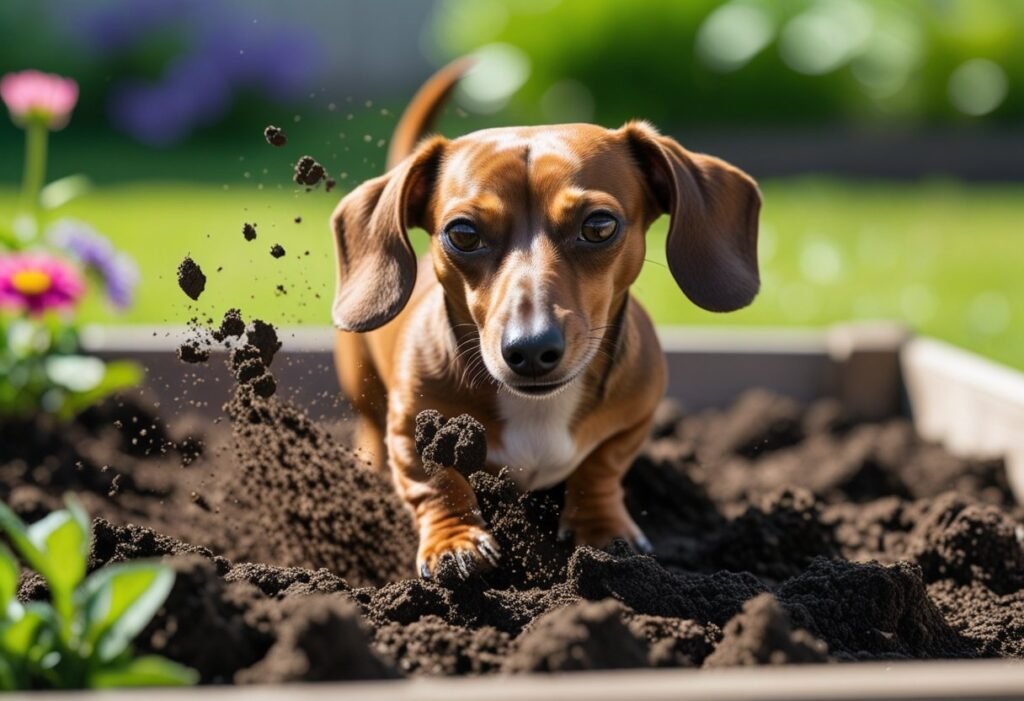
Common triggers include:
- Underground critters: Moles, voles, or insects living under your lawn 🐜
- Neighbor dogs: Smells or sounds from next door 🐕
- Temperature regulation: Digging to reach cool soil on hot days ❄️
- Buried objects: Scents or old items in the yard 🧸
Weather matters too 🌦️. After rain, when the ground softens up, you might see more digging. On hot days, a lot of Dachshunds try to make cooling pits to escape the heat 🌞.
Emotional Causes in Doxies 💖
Your Dachshund might dig for emotional reasons as well. These dogs are sensitive and sometimes use digging to cope with their feelings 🫠.
Boredom is a big one 😐. If your Dachshund doesn’t get enough mental and physical stimulation, they’ll find their own fun—usually by digging 🎾. This gets worse when they’re left alone for long stretches.
Anxiety and stress can show up as digging, too 😰. Your doxie might dig when they’re dealing with:
- Separation anxiety when you leave 🚪
- Nerves during storms or loud noises ⛈️
- Feeling insecure in new places 🏠
Some Dachshunds just want comfort 🛏️. They’ll dig little nests, especially females or dogs looking for a sense of security 🫶.
Recognizing Digging Behavior in Dachshunds
Dachshunds have natural digging instincts from their hunting roots 🦴. Spotting these behaviors early helps you get ahead of the problem before your yard turns into a construction zone 🚧.
Common Signs and Patterns 🔍
Dachshunds have pretty obvious digging patterns 🕳️. You’ll notice paw scratching at the ground, especially after they sniff an area for a while 👃.
Most dig with determination, using those front paws fast while the back legs anchor them ⚡. Look for these favorite digging spots:
- Along fence lines (sometimes plotting an escape!) 🏃
- Under trees or bushes (cool, shady spots) 🌳
- Freshly turned soil or mulch (new smells to explore) 🌱
- The same spots over and over (they pick favorites) ♻️
Some dachshunds dig more in hot weather, looking for cooler dirt 🌡️. Others might circle before digging, kind of like making a bed 🛏️.

🧠 Brain Training for Dogs – Mental Stimulation Made Easy
This online course uses gentle training games to reduce boredom, anxiety, and unwanted behaviors like digging or barking in Dachshunds.
- ✅ Boosts obedience using fun activities
- ✅ Ideal for bored or under-stimulated Doxies
- ✅ 100% positive, force-free training methods

When Digging Becomes a Problem 🚫
Digging gets out of hand when it’s excessive or destructive 💥. You’ll know it’s a problem if your garden beds are trashed or you’re always fixing the landscaping 🌼.
Watch out for these red flags:
- Digging every day or several times a day 📆
- Holes deeper than 6 inches ⛏️
- Plants ripped up or irrigation lines destroyed 🪴
- Dirt tracked inside or covering outdoor furniture 🪑
- Digging that keeps happening even after you try to stop it 🔁
Obsessive digging can lead to health issues too—broken nails, sore paws, or eating dirt 🩺. If your Dachshund suddenly digs a lot more, they might be anxious, bored, or uncomfortable and trying to tell you something 🐾.
How to Stop Dachshund Digging in Your Yard
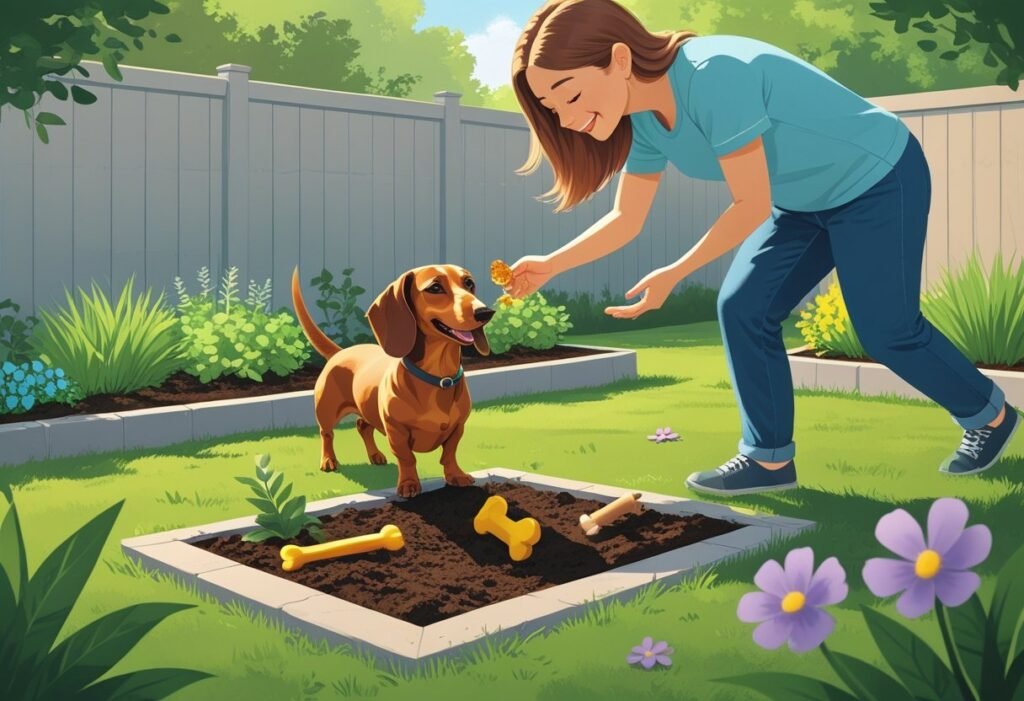
Dachshunds have a real urge to dig, but you can manage it with consistent training and a few changes to their environment 🌱. The right mix of boundaries, rewards, and alternatives will save your yard and keep your dog happy 🐶.
Establishing Yard Boundaries 🚧
Set up a special digging spot—a sandbox or a section with soft dirt works well 🪨. This gives your Dachshund a place to dig without wrecking everything else.
Keep an eye on your dog outside, especially while they’re learning the rules 👀. If you catch them digging where they shouldn’t, redirect them to the right spot right away 🔄.
Try putting up barriers around garden beds. Low fencing or big rocks can block off your Dachshund’s favorite digging zones 🪴.
Make sure your yard’s secure. Use fencing that goes at least six inches underground, since Dachshunds will dig to escape if they’re curious enough 🕳️.

👨🍳 ChefPaw Fresh Food Maker
- ✅ Make healthy meals with whole ingredients
- ✅ Perfect for Dachshunds with food allergies
- ✅ Ditch preservatives and fillers for good

⏲️ Petlibro Auto Feeder
- ✅ Custom meal scheduling via mobile app
- ✅ Keeps portion control consistent
- ✅ Great for busy pawrents and picky eaters
Positive Reinforcement Strategies 🎁
Give your Dachshund treats, praise, or a favorite toy whenever they use their digging area 🐾. Immediate rewards help them make the connection 💡.
Use a simple command like “dig here” every time 🗣️. Stick to the same words and rewards so your dog learns faster ✅.
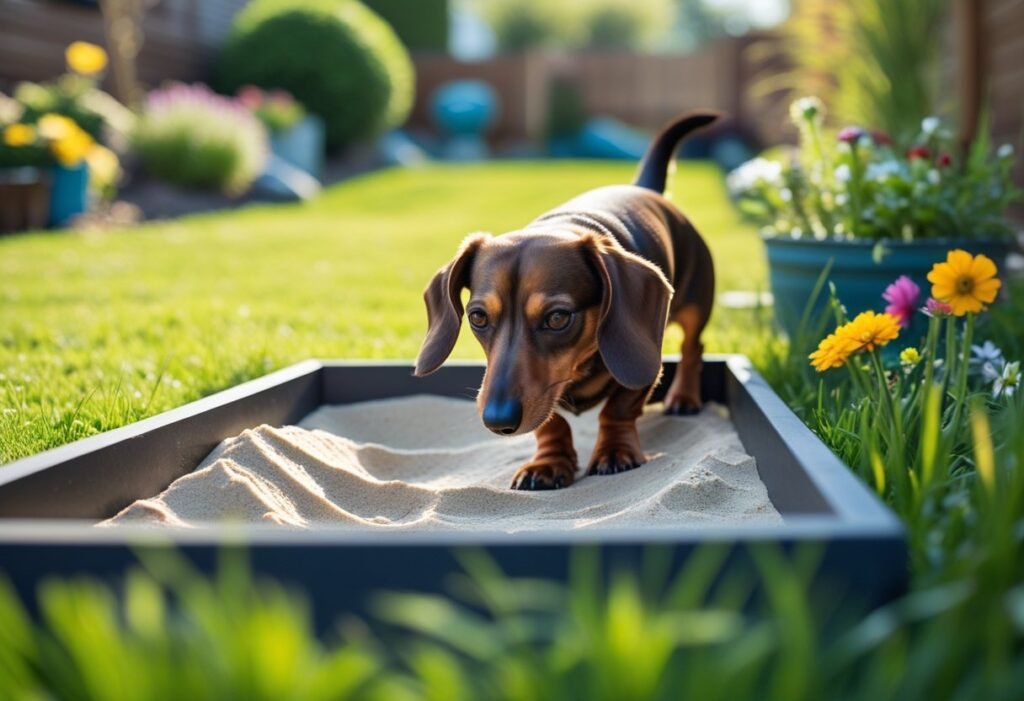
🎉 Grab your free Dachshund care checklist!
Practice “leave it” commands to teach your pup to stop digging when you ask 🚫. Start somewhere quiet before trying it in the yard 🌳.
Make sure your Dachshund gets enough exercise and mental challenges every day ⚽. A tired dog is way less likely to dig out of boredom 😴. Try these:
- Two 30-minute walks each day 🚶
- Puzzle toys 🧩
- Short training sessions 🎓
- Playdates with other dogs 🐕
Deterrents and Safe Alternatives
Use pet-safe deterrents on problem spots 🧼. Most Dachshunds hate the smell of citrus, vinegar, or certain commercial sprays 🍋.
Bury chicken wire just under the surface in areas where they keep digging 🔗. The odd feeling on their paws usually makes them stop ✋.
Give them toys that scratch that hunting itch 🎯. Toys with hidden treats let your dog “hunt” for rewards instead of digging up your yard 🧸.
If your Dachshund digs to cool off, add more shade 🌤️. A cooling mat or an elevated dog bed works wonders on hot days 🛏️.
Bury toys in their digging area to make it more fun than the rest of the yard 🪖. That way, treasure hunting only pays off in one spot 🎉.
Training Your Doxie Not to Dig
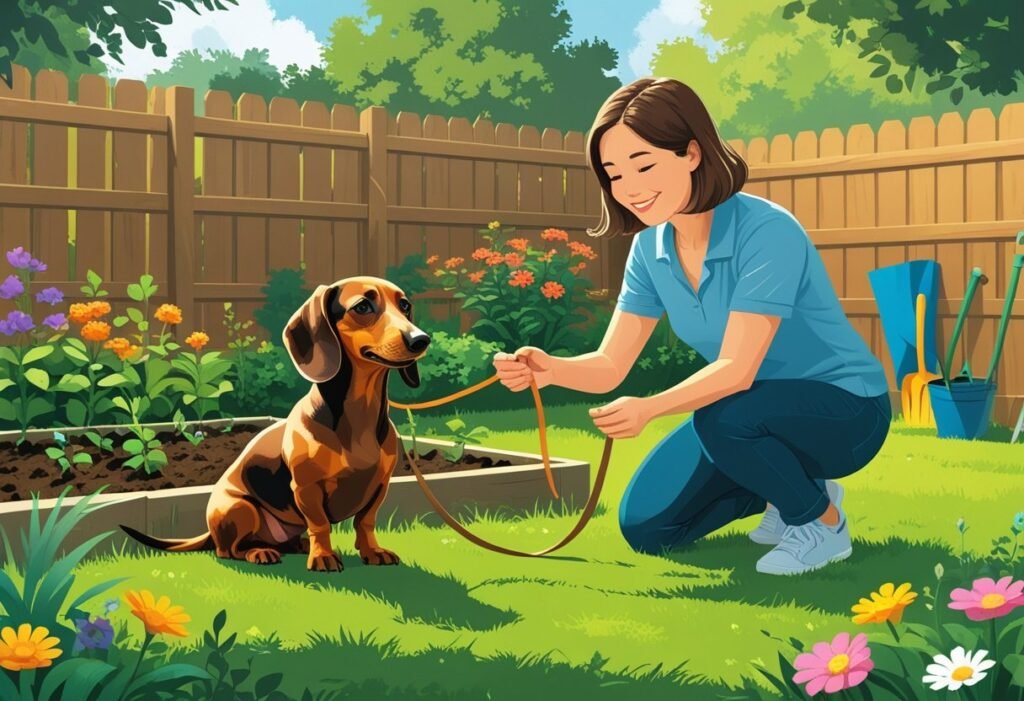
Training your dachshund to stop digging takes understanding their instincts and teaching them better options 🐾. The best approach combines basic commands, redirection, and lots of consistency 🧠.
Basic Obedience Training for Digging 🎓
Start with basic commands like “leave it” and “no” 🗣️. If you catch your dachshund digging, say “no” and offer a toy or another distraction 🎾.
Teach the “come” command, too 📣. If you see digging about to start, call your dachshund over right away 🚶.
If you can’t stop the digging completely, set up a designated area 🪨. Use a sandbox or a patch of garden with loose soil, and hide toys or treats there 🎁.
Reward your dachshund for using their digging spot instead of your flowers 🌸. Positive reinforcement always works better than punishment for these stubborn little dogs 💛.

🧾 The Swiftest Pet Insurance
- ✅ Protect your Doxie from outdoor scrapes or digging-related injuries 🌱
- ✅ Compare top-rated coverage to keep your garden adventurer safe 🐾
- ✅ Peace of mind for every curious dig and muddy pawprint 🏡

🛁 Pride + Groom Grooming Tools Kit
- ✅ Wash away dirt and dust after outdoor play or digging 🪴
- ✅ Gentle tools that soothe skin and keep coats shiny ✨
- ✅ Makes post-yard cleanups quick, easy, and stress-free 💦
Redirecting Digging Instincts 🔄
Dachshunds were bred to dig after burrowing animals, so that urge isn’t going anywhere 🦡. You’ve got to give them something else to do 🧩.
Try these alternatives:
- Puzzle toys that make them use their paws 🧠
- Snuffle mats with hidden treats 🍬
- Indoor dig boxes with blankets and toys 🛏️
- Yard treasure hunts with buried goodies 🪺
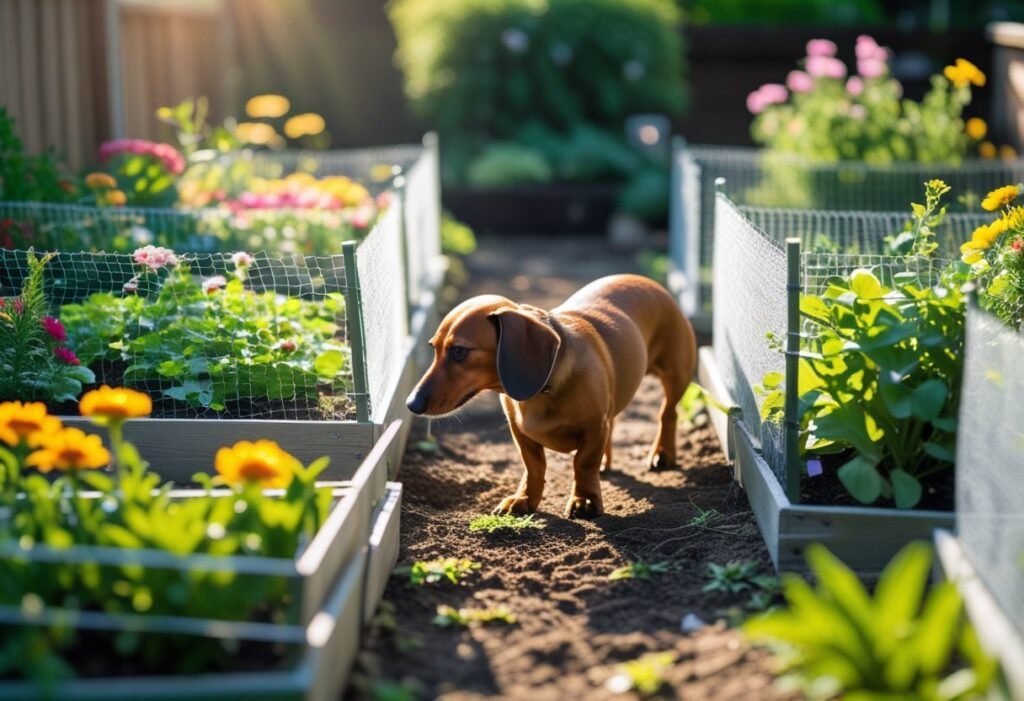
Exercise is a must 🚴. Tired dachshunds are way less likely to dig just for something to do 😴. Shoot for at least 30 to 45 minutes of activity each day ⏱️.
Give them plenty of attention and mental stimulation 🤗. A lot of dachshunds dig when they’re bored or just want you to notice them 👀.
Consistency and Patience in Training 🧘
Dachshunds respond best when you set clear, consistent rules 🪧. Everyone at home needs to stick to the same digging rules—no exceptions, or your pup will just get confused 🔄.
Letting them dig sometimes but punishing them at other times? That just makes things muddled ⚠️. Set boundaries and keep them steady so your dog understands what’s okay and what’s not 🧱.
Use the same commands and corrections every time 🔁. Dachshunds really need a lot of repetition to pick up new habits 🗓️.
Patience is key—training can drag on for weeks, sometimes even months 🕰️. These little dogs are famously stubborn and love doing things their own way 🐕.
Training timeline expectations:
- 1–2 weeks: Basic command recognition 📌
- 2–4 weeks: Beginning to respond consistently ✅
- 1–3 months: Noticeable reduction in unwanted digging 📉
- 3+ months: Reliable behavior change 🏅
Don’t forget to celebrate the small wins 🎉. Even tiny steps forward deserve praise and a treat 🍪.
Providing Enrichment to Prevent Digging

Dachshunds with too much energy often end up digging just to burn it off 🌀. If you keep your dog busy both mentally and physically, you’ll probably see a lot less digging in your yard 🏡.
Toys and Chews for Mental Stimulation 🧠
Puzzle toys are great for keeping your Dachshund’s brain busy 🎲. These toys make them think and can hold their attention for a surprisingly long time ⏳.
Try swapping out different toys every week to keep things fresh ♻️. Food-dispensing toys like Kongs stuffed with treats or frozen peanut butter can keep them entertained for ages 🧊.
Chew toys help satisfy your Dachshund’s urge to gnaw 🦷. Durable rubber toys and dental chews are especially good at redirecting that energy away from digging 🧸.
Set up snuffle mats or hide treats in a specific area 🌿. It’s a mini treasure hunt that scratches the digging itch without messing up your yard 🔍.

🧫 AnimalBiome Gut Health Test Kit
- ✅ Identify gut imbalances that can cause anxiety and restless digging 🌱
- ✅ Improve mood, focus, and digestion naturally 🐾
- ✅ Great for Dachshunds with sensitive tummies or outdoor eating habits 🍃

🧘♀️ Zumalka Calmpet Anxiety Relief Drops
- ✅ Reduces stress that often triggers digging behavior 🪴
- ✅ 100% natural and safe for daily use 🌼
- ✅ Helps your Dachshund stay calm, content, and focused 🌤️
Physical Exercise and Playtime ⚽
Dachshunds may be small, but they still need regular exercise 🚶. Aim for at least 30–45 minutes of activity every day, and break it up if that’s easier ⏱️.
Games like fetch and tug-of-war let them burn off energy and give you a chance to bond 🎾. Dachshunds have that hunting dog streak—games that tap into their tracking instincts are always a hit 🐾.
Try setting up a backyard obstacle course with stuff you already have 🪵. It’s a fun way to challenge them both physically and mentally 🧗.
Swimming is another good option 🌊. It’s gentle on their backs and gives them a full-body workout 💪.
Take walks in new places when you can 🚶♂️. New sights and smells make things interesting and help stave off the kind of boredom that leads to digging up your flower beds 🌼.
Addressing Underlying Issues Contributing to Digging
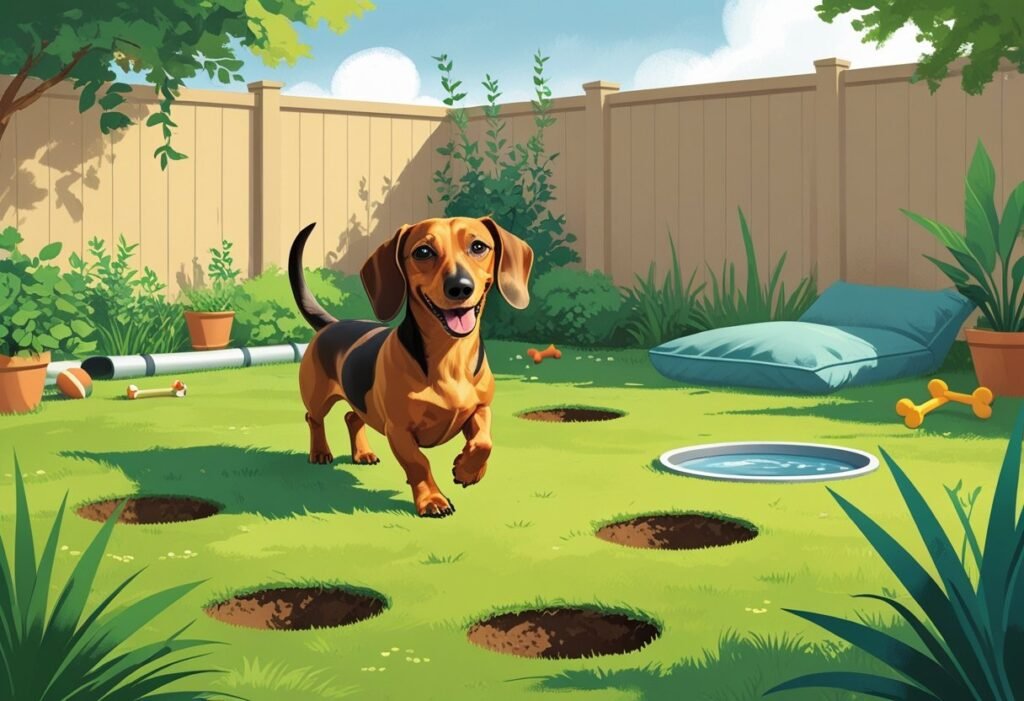
Sometimes there’s more to your Dachshund’s digging than just instinct 🧐. If you figure out what’s really driving the behavior, you’ll have a better shot at stopping it 🎯.
Separation Anxiety in Dachshunds 💔
Dachshunds get attached—sometimes a little too attached 🐾. When you leave, their anxiety can show up as digging, along with barking, chewing, or accidents in the house 🐶.
Keep departures calm—skip the dramatic goodbyes 👋. Toss an old t-shirt or something with your scent into their bed or crate for comfort 🧺.
Start by leaving them alone for just a few minutes, then slowly work up to longer stretches ⏱️. It’s a gradual process, but it helps them get used to being by themselves 🧘.
If your dog’s anxiety seems severe, talk to your vet about possible meds or calming supplements 💊. Sometimes professional training is the way to go for really tough cases 🎓.

🛏️ Majestic Orthopedic Dog Bed
- ✅ Cushioned support for aching joints
- ✅ Soft cover is removable and washable
- ✅ Great for senior Dachshunds or IVDD recovery

🪜 Majestic Pet Pet Stairs
- ✅ Lightweight, soft stairs for small breeds
- ✅ Helps prevent jumping injuries
- ✅ Machine-washable cover for easy cleaning

Boredom and Loneliness 🕳️
Dachshunds are smart and active 🧠. If they don’t have enough to do, they’ll find their own fun—usually at your expense 😅.
Signs of boredom include:
- Excessive digging 🕳️
- Destructive chewing 🧸
- Hyperactivity when you return 🚀
- Restless pacing 🌀
Pile on the exercise—shoot for 30–60 minutes of play or walking every day, split up if needed 🚶. Brain games are just as important, so keep those puzzle toys handy and swap them out often 🔄.
Arrange playdates with other dogs if your Dachshund is friendly 🐕. That gives them exercise and some social time 🫂. If you’re gone all day, maybe hire a dog walker for a midday break 🐾
Maintaining a Happy and Safe Yard Environment
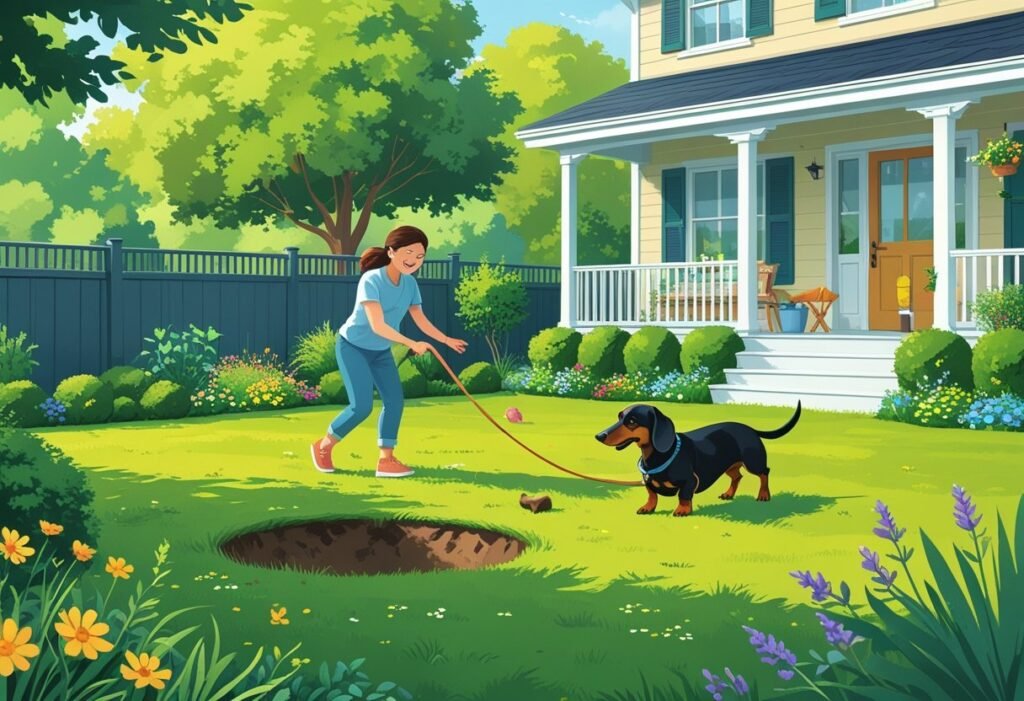
Making your yard work for both you and your Dachshund takes some planning 🛠️. The right setup helps discourage digging and keeps your pup busy and happy 🌿.
Protecting Flower Beds and Lawns 🌸
Put up physical barriers to keep your Dachshund out of your garden beds 🪴. Even a 12–18 inch decorative fence can do the trick without ruining the look of your yard 🌼.
Try pet-safe repellents around the edges of your garden 🧴. Citrus oils or bitter apple sprays set clear boundaries—just remember to reapply after it rains 🌧️.
Give your dog a “dig zone” filled with loose dirt or sand 🏖️. Hide toys or treats there to make it more appealing than your flower beds 🎾.
Cover bare soil in your garden with river rocks or decorative stones 🪨. It’s not comfy for digging and actually looks nice, too 🧑🌾.
🌿 Smart Essentials to Prevent Digging & Keep Your Doxie Engaged 🐾
- 💧 Petlibro Water Fountain — Keeps your Doxie hydrated during playtime, reducing boredom and excess digging caused by restlessness.
- 📹 Petcube Cam 360 — Keep an eye on your Dachshund when outdoors or alone, preventing destructive digging or garden mischief.
- 📍 Tractive DOG GPS Tracker — Stay worry-free when your Doxie explores the yard or garden, knowing you can track their location instantly.
- 🍖 Petcube Bites 2 — Reward good behavior and discourage digging instantly, even when you’re away, with built-in treat dispensing.
Dog-Safe Landscaping Solutions 🌱
Stick with non-toxic plants 🌷. Roses, sunflowers, marigolds, and most ornamental grasses are all safe bets 🌻. Get rid of anything dangerous like lilies, azaleas, or sago palms ⚠️.
Lay down paw-friendly paths 🚶♀️. Smooth flagstones or compact gravel give your dog interesting routes to explore without inviting them to dig 🐾.
Set up shaded spots where your Dachshund can chill outdoors 🌤️. Dogs sometimes dig to find a cool spot, so a little shade might solve the problem 🧊.
Skip chemical fertilizers and pesticides 🚫. Use organic stuff like compost or neem oil to keep your yard healthy and your dog safe 🌿.
When to Seek Professional Help
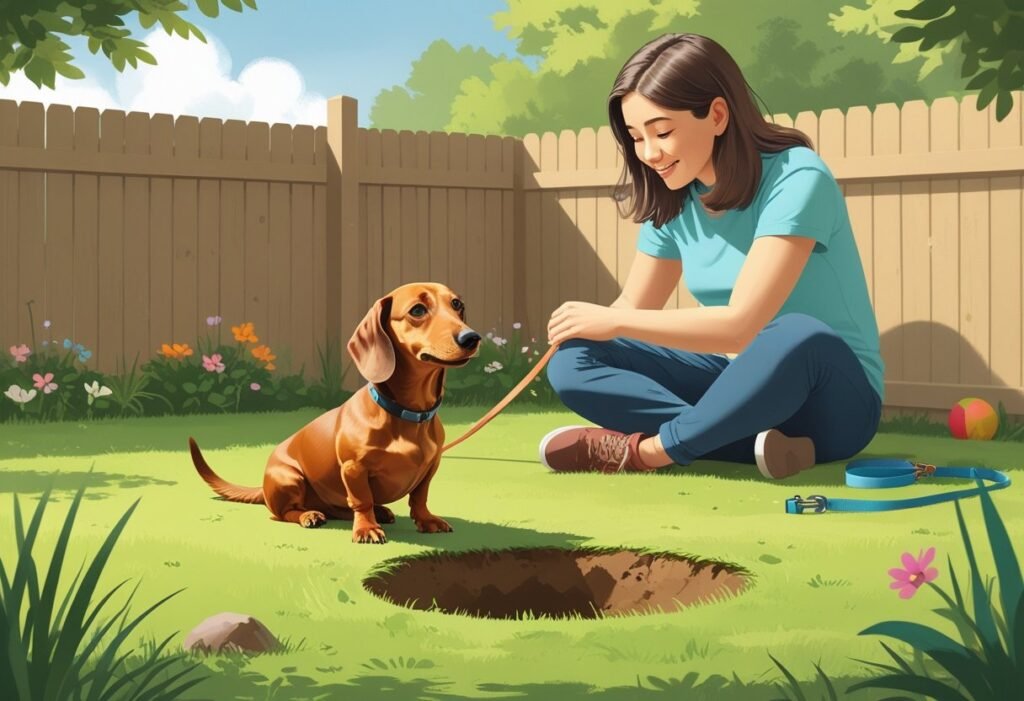
Sometimes, no matter what you try, your Dachshund just won’t stop digging 🕳️. If things aren’t getting better—or they’re getting worse—it might be time to call in the pros 📞.
Working with a Dog Trainer 🐕🦺
A good trainer can figure out why your dog’s digging and come up with a plan that fits your situation 🧠. Trainers who know small breeds or have Dachshund experience are especially helpful 🐾.
They’ll probably use redirection and teach your dog better ways to spend their energy 🔄. Private sessions are great for digging issues, while group classes help with general manners 🗓️.
Plan on several weeks of training ⏳. Trainers usually give homework so you can keep working on things between sessions 📝.
💛 Yard-Smart Picks: Stop Digging & Keep Your Garden Peaceful
- 🦺 Embark Pet Adventure Harness – Use focused, controlled walks and structured outdoor play to burn excess energy so your Doxie is less likely to dig out of boredom.
- 🌿 Innovet PurCBD Oil – Gentle, natural support to reduce anxiety and restless digging; helps calm overstimulated pups during yard time.
- 🛁 King Klean Dog Shampoo (King Kanine) – Wash away dirt and garden allergens after digging sessions; soothing formula helps prevent irritation that can make dogs itch and dig more.
- 🎨 Purr & Mutt Personalized Dachshund Art – Celebrate a digging-free garden and reward training milestones with a cute keepsake that reinforces positive behavior.
- 👕 Dog is Good Apparel & Gifts – Use fun, positive gear to mark training progress and make outdoor practice feel like a happy routine for your pup.
🌱 Combine structured exercise, calm-support supplements, and positive reinforcement — small changes create a peaceful, dig-free garden. 💛
Consulting a Veterinarian about Behavioral Issues 🩺
If your Dachshund’s digging seems obsessive or comes with other weird behaviors, call your vet 🐶. Sometimes there’s a medical or psychological reason behind it 🧬.
Possible medical causes include:
- Anxiety or stress disorders 😰
- Pain that causes restlessness 🛌
- Hormonal imbalances ⚖️
- Neurological issues 🧠
Your vet might run blood tests or other checks to rule out health problems 🧪. For anxiety or compulsive digging, they can suggest meds or refer you to a veterinary behaviorist 💊.
Some vets focus on behavioral medicine and can offer more targeted advice 🎯. They might recommend changes at home or suggest seeing a specialist for tougher cases 🧑⚕️.
🐾 Don’t Miss Out!
Download our free Dachshund care guide to keep your furry friend happy and healthy.
Get Your Free Guide 🐶Frequently Asked Questions
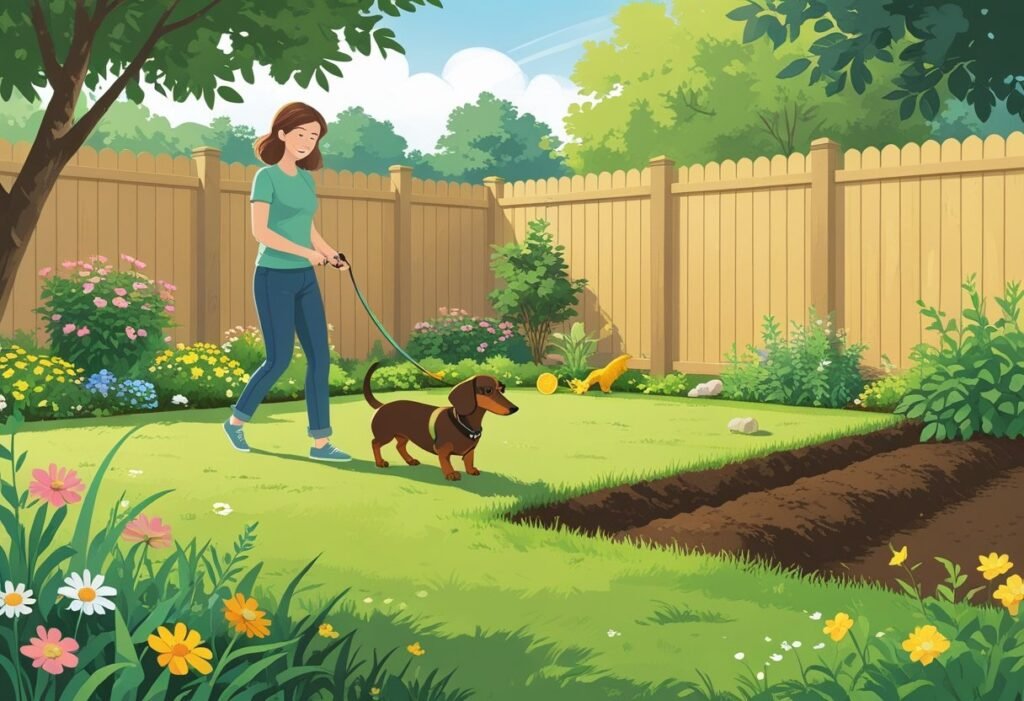
Dachshund owners are always looking for safe, natural ways to stop their dogs from digging 🌿. Here are some of the most common questions and solutions for these curious little diggers 🐾.
What natural remedies can prevent my dachshund from digging in the yard? 🍊
Citrus peels tossed in problem spots can work wonders—most Dachshunds hate the smell 🍋. Lavender and marigold plants also act as natural barriers, plus they look nice 🌼.
You can bury chicken wire or place big rocks where your dog likes to dig 🪨. These make digging tough without actually hurting your pup 🛡️.
Are there any effective dog digging repellents that are safe for my pet? 🧴
Bitter apple or citrus-based commercial repellents are pretty safe and usually do the trick ✅. Always double-check that anything you use is non-toxic and pet-friendly 🐶.
Granular repellents with citronella or mustard can be sprinkled in digging areas, but you’ll need to reapply after rain 🌧️. Some pet stores sell motion-activated sprinklers—just water, but enough to surprise your dog away from digging spots 🚿.
How can I use cayenne pepper to deter my dachshund from digging? 🌶️
Mix a little cayenne pepper with water in a spray bottle and spritz it on digging spots 💧. The smell is usually enough to keep most Dachshunds away 🚫.
Be careful—don’t spray it directly on your dog or anywhere they might get it in their eyes or nose ⚠️. Some dogs aren’t fazed by cayenne, so you might need to try something else if it doesn’t work 🔁.
What non-toxic digging deterrents are recommended for dogs? 🌱
Used coffee grounds are a solid, non-toxic option ☕. Most Dachshunds can’t stand the strong smell, so sprinkle them where digging is an issue 🐕.
Dilute vinegar with water (half and half) and spray it on digging spots 🧪. It’s safe for dogs and plants, but don’t spray it directly on your pup 🌿.
Wind chimes or other sound deterrents near digging areas might interrupt the habit 🔔. Dachshunds can be startled by unexpected noises while digging 🎶.
Can I use vinegar to stop my dachshund’s digging behavior and is it safe? 🧼
Vinegar, when diluted, is totally safe as a digging deterrent 👍. Mix equal parts water and white vinegar in a spray bottle and use it on trouble spots 🧴.
If your Dachshund licks or walks through it, there’s no harm done, but avoid spraying it directly on your dog or on freshly planted areas ❌. You’ll probably need to reapply every few days or after rain, and some dogs might get used to the smell—so switch it up with other deterrents if needed 🔄.
Why has my female dachshund suddenly started digging holes? 🐕
Hormonal changes sometimes trigger digging in female dachshunds, especially if you haven’t spayed them yet 🩺. Digging tends to ramp up during heat cycles, probably because of a strong nesting instinct 🐾.
Environmental shifts—like new neighbors, construction noise, or even critters wandering through your yard—can make a dachshund anxious 🌪️. She might start digging just to cope with all those unfamiliar sights and sounds 👀.
Boredom is another classic culprit 😐. If your exercise routine has slowed down or she’s not getting enough mental stimulation, don’t be surprised if she starts digging for fun 🎾.
Try mixing in more walks or play sessions 🚶. That usually helps curb the urge to dig, though every dachshund is a bit of an individualist 🎭.



